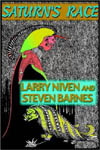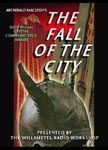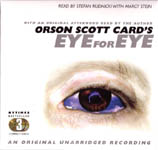
 Saturn’s Race
Saturn’s Race
By Larry Niven and Steve Barnes; Read by Scott Brick
10 Cassettes or 12 CDs – 13 Hours 54 Minutes [UNABRIDGED]
Publisher: Books On Tape, Inc.
Published: 2000
ISBN: 0736659374 (cassette), 0736671366 (cd)
Themes: / Science Fiction / Artifical Intelligence / Consciousness Uploading / Cyborgs / Politics / Population Control / Life Extension /
Chaz Koto is a citizen of Xanadu, a near future perfect society hosting the wealthiest men and women on Earth. Along with his fellow citizens, he bears the burden of a dark secret that the outside world would be shocked to hear. Lenore Myles is a student who travels to Xanadu and becomes involved with Koto. When Koto unwittingly lends her his access codes, Lenore stumbles upon the grisly truth behind Xanadu’s glittering facade.
The title is deceptive. The planet Saturn plays no role in the plot and nobody in the book is racing anywhere. This is an earth-bound adventure set in the near future. I figured out what the title meant near the end of the book, but the rest of the novel was relatively predictable. For instance, there is a revelation that happens within the first couple of chapters but it was so broadly telegraphed in the first scene the involved character shows up in that I was bored by the revelation rather than surprised by it. Ultimately Saturn’s Race is one of those novels that just fails to gel. There’s a plot, plenty of interesting ideas and a resolution, but frankly the plot is mediocre, the ideas relatively minor, and the resolution comes through only on the most basic level.
For me, the most memorable concept used in Saturn’s Race is that of “metaphors.” Basically Niven and Barnes illustrate that metaphors, like computer languages or a computer graphic interface, are used as handy tools to leverage work. It’s why poetry can say so much with so few words – the words are densely packed, brimming with meaning. It is also why a little pointer dragging a few color pixels across a screen can unmake or move a file in ways far quciker and easier than by command line interface. In other words computer programs are really elaborate metaphors for the manipulation of data. This is brought to life in the novel when a character runs an artifical intelligence program that simulates Rex Stout’s corpulent detective Nero Wolfe. It’s a neat idea. But ultimately the novel didn’t move me as I had hoped it might. Overall, this is passable faire, but I doubt I’d need to listen to it again anytime soon.
The cover art for Saturn’s Race is almost incomprehensible. Is that a seahorse on there? I can’t tell. The paperback version has a painting of two genetically-modified sharks on the cover. That would have been more apropos. Reading the book is the ubiquitous Scott Brick. Scott does his very best to bring energy to the lackadaisical pace. For the most part it works, since the novel doesn’t bore in the listening, though I’m sure I’d have stopped reading were I experiencing the paper edition. Saturn’s Race is still available to be purchased from the Books On Tape website. But who knows how long that will be for? BOT was forced to dump a good chunk of its older science fiction titles when it got purchased by the aptly titled Random House a couple years ago and this fact has made many of its excellent unabridged titles quite valuable on the secondary market. The same loss may happen again soon to the remaining BOT library. I don’t think out of print copies of Saturn’s Race will be selling for thousands any time soon, but if you think you ever might want a copy acting sooner rather than later may save you some money.
Posted by Jesse Willis





